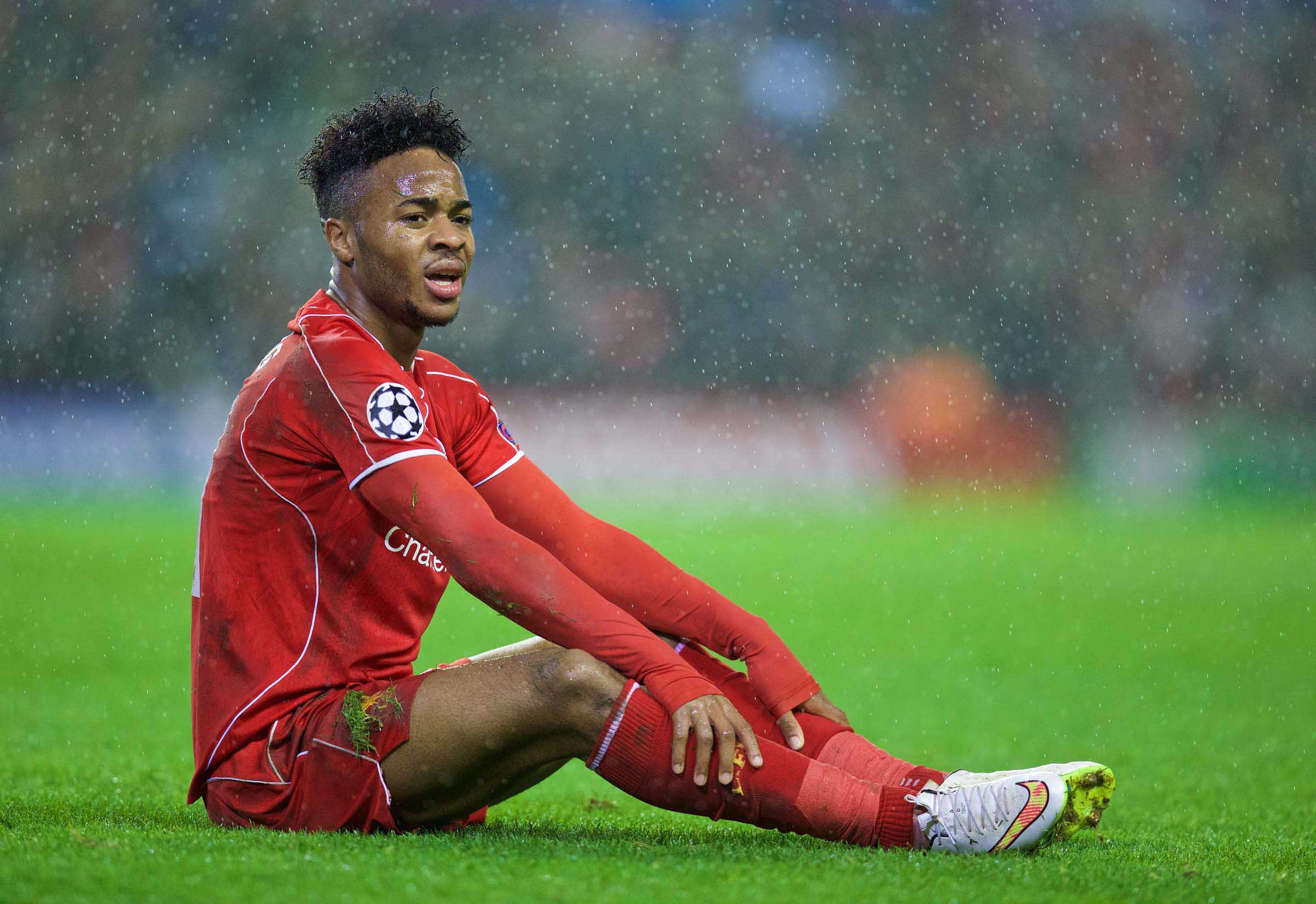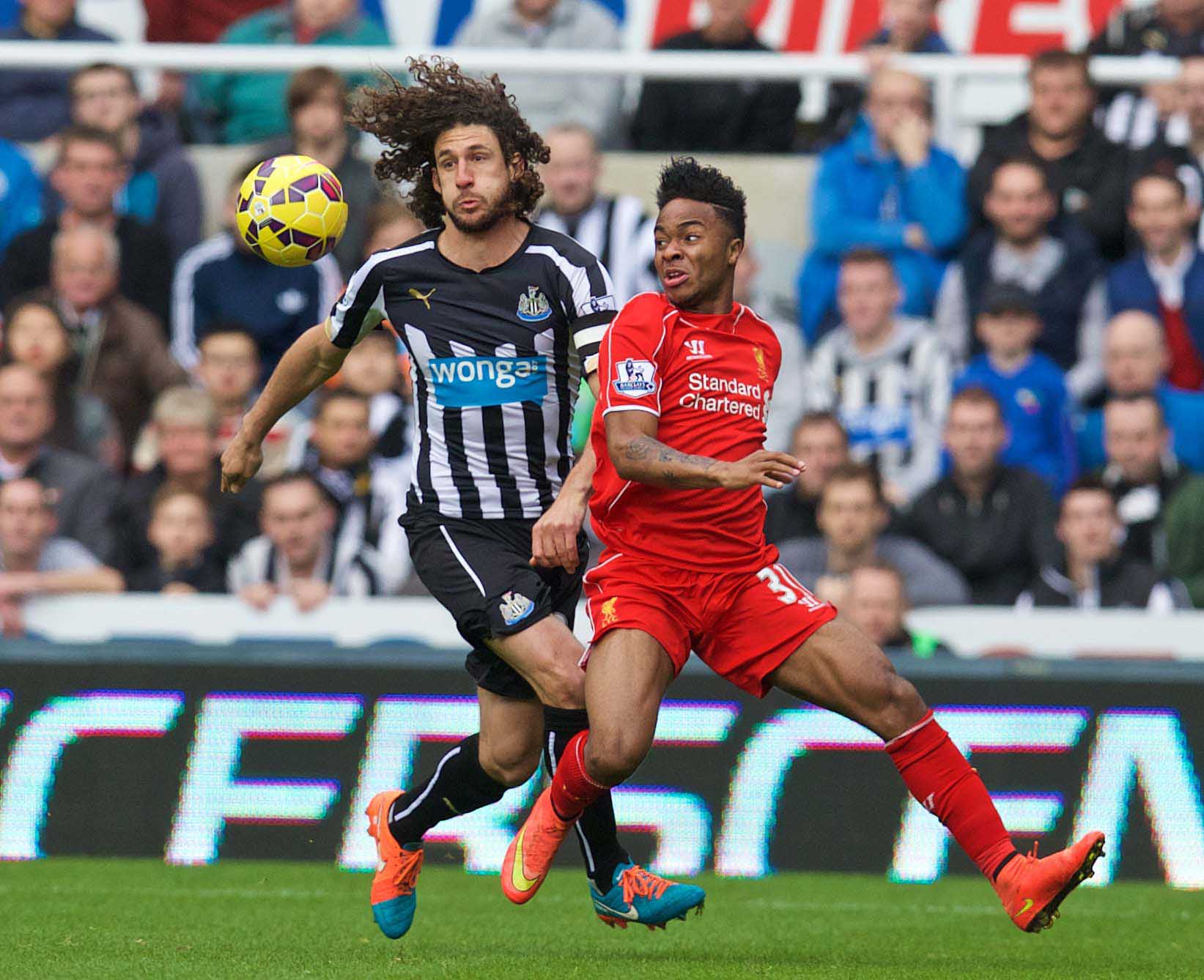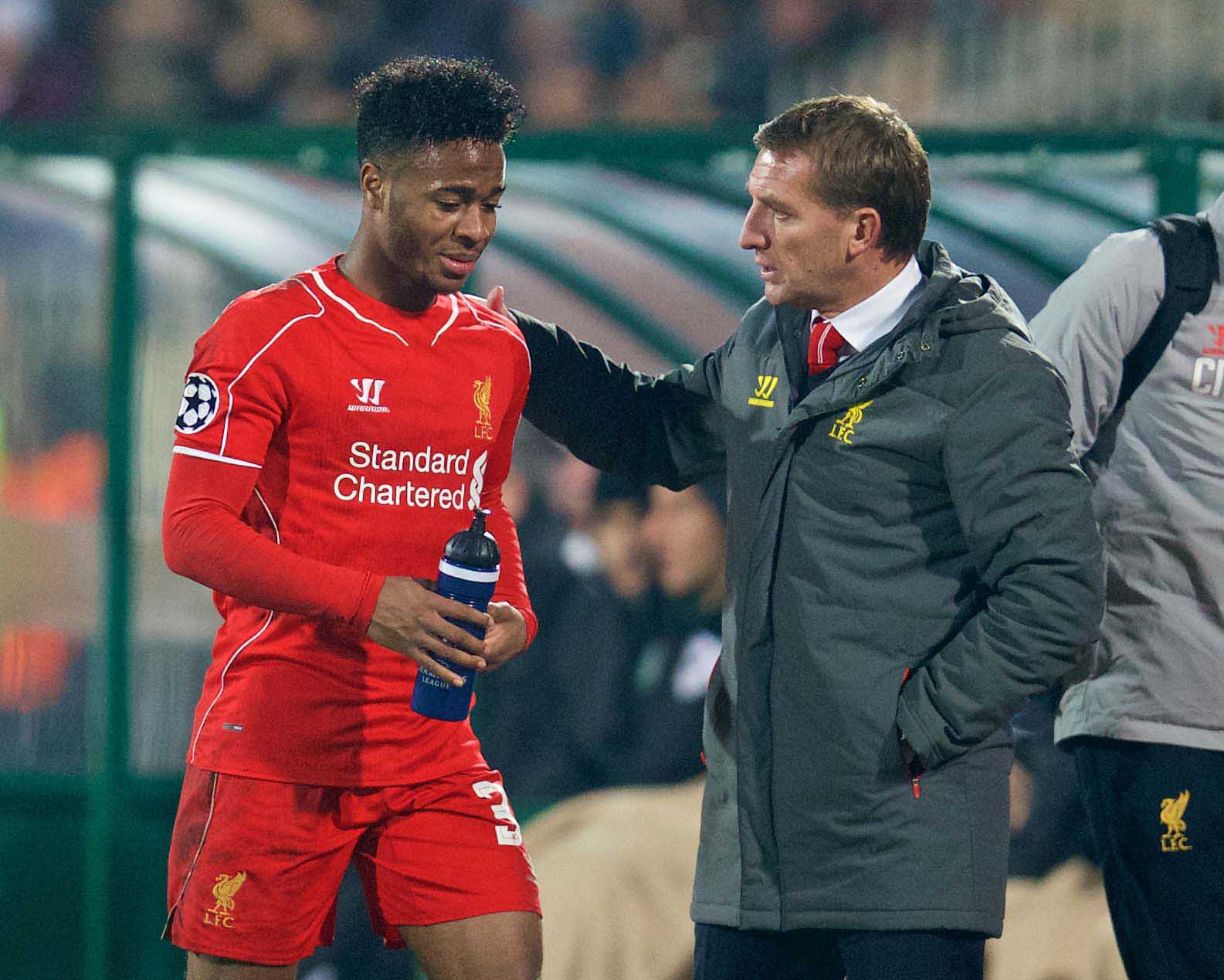
JUST as democracy is said to be the worst political ideology except for all the others, so Raheem Sterling would currently appear to be Liverpool’s worst player except for – well, you get the picture, writes PAUL CANTWELL.
So poor have the Reds been this season, both individually and collectively, that Sterling – a player with just three goals and as many assists to show for 22 first team appearances – would be the overwhelming favourite to pick up the club player of the season award were it to be conferred tomorrow.
However, while Sterling may be a bit short in the hard currency of goals and assists, he is rich in promise and, using this promise as leverage, Sterling’s agent will be looking to significantly boost his client’s bank balance in the current contract negotiations between player and club.
In a Liverpool side largely bereft of imagination and character, Sterling has been arguably the only player to exhibit both qualities on something approaching a regular basis. Amid some of the most insipid and impotent attacking displays Anfield has seen in years, Sterling’s eagerness to get on the ball and at least try to make things happen has singled him out as a rare bright spot in an otherwise gloomy season so far.
That Sterling deserves a new, improved contract, is obviously not in question. However, what is rightly up for debate is the figure on the page. On the one hand you have an England international with bags of pace who’s clearly been the club’s leading performer so far this season and a Young Player of the Year nominee last time out. Plus, with UEFA insisting on a quota of home-grown players in each Champions League squad, Sterling’s Premier League value – like that of all English players – increases before he even kicks a ball.
On the other hand, however, you have a player for whom valid questions remain over end product, decision-making and, indeed, long-term ability to rise to the very pinnacle of the game. Too often Sterling wastes good positions by taking too much out of the ball, running blindly into yet another alley heavily populated with opposition defenders. Although it’s true that the players’ often poor decision-making could, at least in theory, be coached out of him, the fact remains that having made his 99th first team appearance against Basel on Tuesday night, Sterling has an underwhelming 15 goals to his name, and this season only has a goal or an assist every 308 minutes.
Were Sterling not playing in such an under-performing side, this meagre return would surely have resulted in more bench time and as a result significantly weakened his agents’ negotiating position. But, due to a number of factors, Sterling’s negotiating position is anything but weak.
Not for the first time Roy Hodgson has done Liverpool Football Club no favours, this time by making Sterling not just a pivotal part of his England set-up, but arguably the only exciting element of an otherwise soporific team. As a result Sterling’s moderately promising international displays have been given the standard over-the-top treatment by the giddy denizens of the national press.
Suddenly there’s talk of Real Madrid sniffing around the 20 year old, although there’s little evidence to suggest that particular rumour originated anywhere other than in the overactive imagination of an excitable red top hack. As they have done with countless others down through the years, the media have created a young English player for whom ability on the page far outstrips ability on the pitch.

Although the club’s reported initial offer of £70k per week appears very low for a player of Sterling’s profile, these negotiations should not necessarily take the form of previous ones with young, home-grown stars at the club, such as Robbie Fowler, Michael Owen and Steven Gerrard. Such was the unimpeachable talent of that trio at Sterling’s age that the club were rightly urged to accede to the player’s every demand, but Sterling is nowhere near the level of any of the aforementioned, all of whom were bona fide superstars by the time of making their 100th club appearance.
None of which is to say that Sterling can’t go on to become a Liverpool great, but merely that the current contract talks should be based on present reality rather than future dreams. So if £70k is too little, what then is a fair offer? Well, therein lies the rub. While Sterling and his advisers may focus more on the weekly figure, the club will quite rightly be looking at the total cost of the contract.
For instance, were Sterling to accept a five year contract for the £70k per week reportedly on offer (which is very unlikely we are told) it would cost the club in the region of £18m. Few would argue Liverpool wouldn’t get at least that were they of a mind to sell Sterling next month. But by the same token, if Sterling were to get, say, £120k a week, that would represent a £31m investment from the club. Whilst Sterling is young, English and undoubtedly talented, the question must be asked: is he £30m+ talented?
Many observers believe so, including one with a better vantage point than most — club captain Gerrard, who recently predicted Sterling will go on to become a ‘future superstar’ of the game. The problem with such lofty predictions is that they are ten-a-penny in today’s game and even more frequent if the player in question happens to be in possession of an English passport.
This time last year we were hearing similarly heady pronouncements about the merits of — then England eligible — Adnan Januzaj. Last week Januzaj was linked with a loan move to Real Sociedad after appearing to be left in limbo at Manchester United.
Whether Sterling develops into the next Gareth Bale or remains an Aaron Lennon-type player who promises much only to deliver far less, will — in hindsight — determine the value or otherwise of the contract the club offer Sterling. As a purely business decision, however, it would clearly make sense to offer the player an enticing new deal to tie him to the club for the long-term, if for no other reason than to avoid a McManaman/Owen scenario where our brightest talents leave for the price of a Christian Poulsen.
In the end, giving Sterling a contract on whatever terms he wants may well turn out to be the worst option. The worst option that is, except for all the others.












Much depends on what the player himself wants. If Suárez (and his wife) had *wanted* to stay at LFC and he had continued to be well managed and nurtured there, he may very well have flourished and been the superstar of the PL for a 2nd season and possibly beyond. We’ll never know. But he chose personal considerations and desire over loyalty. He may live to regret that professionally. Let’s hope Raheem Sterling doesn’t let his agent’s greed persuade him to do something similar.
“… the club’s reported initial offer of £70k per week appears very low for a player of Sterling’s profile,” Sums up why I’m disillusioned with modern football. I barely afford to pay for my season ticket and I read this.
Brilliant article. Not only agree with everything within it but it was also brilliantly put together.
Goals and assists. August 2013 to 12th December 2014.
Sterling
13 goals
9 assists
Hazard
19 goals
8 assists
Silva
9 goals
9 assists
Mata
10 goals
7 assists
Oscar
11 goals
5 assits
Ozil
6 goals
10 assists
Ramsey
13 goals
10 assists
Lallana
11 goals
6 assists
Coutinho
6 goals
7 assists
Nasri
7 goals
9 assists
Nice stats
Sterling has the potential to become a great, but only if he has the intellect to realise his agent works for him, not the other way around.
Contract negotiations should be handled privately and with discretion. There are way too many leaks to the press, and Sterling needs to stamp these out, because ultimately they are not in his long-term interest. If he wants a bigger salary – fine – but why alienate the fans and club in the process?
Rodgers needs to get hold of this situation fast, but he’s under pressure, and the agent can smell blood.
What this situation needs more than anything is for Sterling himself to reign the agent in. Some might also call that a show of respect for the club that has played a huge part in making him what he is.
The statistics that are quoted above are interesting (but only partial and therefore skewed) – but what I would note is that each of these other players is handled by an agent, and none of them go about their business in such a negative, barrow-boy way.
Stats are all well and good, but it’s the impact that goals and assists have on a game that matter. If you get the fourth goal out of five in a 5-0 win, it’s less of an impact than if you get the opener at OldTrafford today, or the equaliser at 1-0 down, or the goal to bring us back into the game at 2-0 down….all of which were clear cut chances he spurned today.
Sterling will never be bracketed with Suarez, Messi, Robben, Bale, Ronaldo etc if he can’t score. They all can, and that’s why all this talk of Madrid is probably balls, because they ain’t gonna buy a player who fluffs his lines on the big occasions
I am a big fan of Raheem – he grew up in the same part of Kingston as a couple of cousins of mine, and I desperately want him to succeed at Liverpool, and for LFC to build the next generation around his talents, but he has to work on composure, ruthless finishing and decision-making….
Do you actually watch football or just read stats? Any idiot can see Sterling is already our best player alongside Sturridge. Pay him what he’s worth in the current market or there’s plenty of more successful clubs ready to do so.
If we start losing players like Sterling we’re completely fucked in our desperate struggle to remain relevant at the business end of league football.
Christ, someone talking sense. In short supply.
Very insightful piece which offers much food for thought regarding young Raheem.
Like the rest of the team, he has certainly regressed alarmingly in the past several months.
The fact that we are so reliant on a 20 year old speaks volumes about the shite that Rodgers has brought in to shoulder the attacking burden.
While a very exciting player when he’s on form with a surrounding cast firing on all cylinders, I agree with the author that Sterling couldn’t hold a candle to Fowler/Owen/Gerrard and their contributions/impact at an equivalent age.
$70k a week? Any more is just pure greed on his agent’s behalf.
You do the “math!”
To be asked to carry the full weight of this Liverpool Team into every game would have been a tall order for even Rush and Dalglish.
Gerrard is another one.But at least he has nearly 20 years experience.Sterling is just 20 years old!
Just lay off him eh?
Pay him 100k on a 4 yr contract with a 70m buyout clause.
Simple.
At the rate Madrid are distorting the market 70m might be the going rate for an average midfielder in a few years.
100k for 5 years with a 100m buy out clause – a proper one, not a nod and wink from Ayre!
The problem with Sterling for me is the rest of the team. All the weight of creativity is on his shoulders. With no quick strikers to take defenders away and create spaces for Sterling, he will be less effective. At the beginning of the season he was scoring 3 in 4 games I believe but all of that has tailed off in my opinion because Sturridge got injured. You could see in Sterling’s goal and man of the match performance at Spurs for example, that it was Sturridge’s runs and his general threatening presence on the pitch that gave him more licence to kill.
I believe that if we get Sturridge fit and another quality pacy striker Sterling would be bagging them goals in from the no.10 role. From the no.10 he can make late runs into and around the box and use his pace and dribbling ability to create chances. Quality strikers in front of him stretch defenders and give him the opportunity to get in the box and score.
It’s the same case with Eden Hazard for example whose goal rate and general play has got even better this season because of the presence of Diego Costa and Fabregas. Last season with dud strikers like Torres and an aged Eto’, Hazard was Chelsea’s only really consistent creative outlet and defenders could gang up on Hazard and make it much harder for Chelsea to score. This season with no SAS, defenders can put more focus on Sterling without fear that a slow Lambert or unintelligent Balotelli will hurt them.
“With no quick strikers to take defenders away and create spaces for Sterling, he will be less effective.”
Key point this. Each of the opposition back four, fullbacks and centre-halves, can do a “job and a half”, their job and half of someone else’s, because Suarez/Sturridge aren’t spinning in behind them or hunting down the ball when their keeper plays it out. The extra time and space lets them take liberties and they can close down Sterling’s lines and hunt him in groups.
Why would you go there? I mean if Raheem is meant to chose us over a sense of loyalty to the club and fans, why would you write this article questioning his worth to the team on a prominent fan website.
Not only that but it was completely boring and not something we need to worry in the slightest about considering how tight the management are with wages (relatively speaking). So why not show the lad some respect for not getting derailed by the wave hysteria that sweeps all moderately good English talent, putting his head down and developing into a very good footballer with still plenty of potential?
Player agents on the other hand can go fuck themselves, the greedy bastards, but we are stuck with them unfortunately.
Sterling was a revelation last season but then again he had Suarez and Sterling in front of him. He looked pretty good in the opening couple of games too. Let’s not rush to judgement, you try being a creative midfielder with Rickie or Mario in front of you. It’s no surprise that Coutinho’s form has tailed off too. That’s the context within which we should measure Raheem’s performances. The obvious comparison is Suarez’s first season when he tried to do too much himself and ended up too knackered to shoot accurately: he needs better players around him.
Fuck me, if there was a “conundrum” before the Utd game, what is there now? An enigma, wrapped inside a mystery, stuffed half-way up Derren Brown’s arse?
Indeed. His confidence, like so many others, is shot to pieces. Look at Balotelli: the one thing you could rely on, despite his obvious weaknesses, was his finishing prowess. Now he looks as though he’d need ten shots to register a goal. Disappointing stuff, something is very wrong at the club at the moment.
Sterling can sign a new contract earning him the same money as Sturridge in a couple of years time once he’s learnt how to score at least 1 out of 3 sitters at Old Trafford.
Score sitters? Finish I meant. I’m very hungover.
I’m still lost for words. That’s a terrible Utd team. How are they 3rd? How did we lose to them by 3 goals? If I’m forced to find something encouraging, I’d say dropping Mignolet perhaps indicates BR has grown a pair and our passing and pressing was good in the first 10-15 minutes (for the first time in a long while). On the other hand, our defending is still Benny Hill at his best. For the love of man, someone put Lovren out of our misery.
This is turning into a nightmare of a season. As they say, I can cope with disappointment, but it’s the hope that gets to me.
You’re right about the passing and pressing but playing no striker against a ‘defence’ like that is just dumb. And that’s the worry, he’s made a series of inexplicable decisions this season and just when you think he’s learned (starting Lucas and Toure, moving and rotating the skipper, subbing Lallana) he reverts to type, like a dog to its vomit (though in fairness, most dogs don’t return to the scene of the crime). His thinking is so muddled, he no longer seems able to distinguish between game plans and the opposition: how many creative players do you need on the pitch against this United? They may have been of more use against Basel.